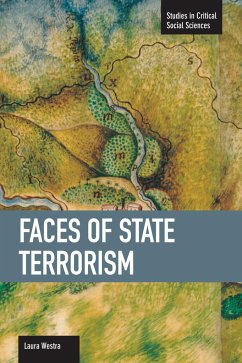Laura Westra
Faces of State Terrorism
Laura Westra
Faces of State Terrorism
- Broschiertes Buch
- Merkliste
- Auf die Merkliste
- Bewerten Bewerten
- Teilen
- Produkt teilen
- Produkterinnerung
- Produkterinnerung
Terrorism is usually discussed as the actions of individuals. This book argues that Governments carry out most acts of terrorism.
Andere Kunden interessierten sich auch für
![Global Political Economy and the Modern State System Global Political Economy and the Modern State System]() Tobias Ten BrinkGlobal Political Economy and the Modern State System31,99 €
Tobias Ten BrinkGlobal Political Economy and the Modern State System31,99 €![Modernity and Terrorism Modernity and Terrorism]() Milan ZafirovskiModernity and Terrorism37,99 €
Milan ZafirovskiModernity and Terrorism37,99 €![Global Discontents Global Discontents]() Noam ChomskyGlobal Discontents16,99 €
Noam ChomskyGlobal Discontents16,99 €![Optimism Over Despair Optimism Over Despair]() Noam ChomskyOptimism Over Despair13,99 €
Noam ChomskyOptimism Over Despair13,99 €![The Postcolonial Orient The Postcolonial Orient]() Vasant KaiwarThe Postcolonial Orient43,99 €
Vasant KaiwarThe Postcolonial Orient43,99 €![Global Labour in the Fourth Industrial Revolution Global Labour in the Fourth Industrial Revolution]() Adrián Sotelo ValenciaGlobal Labour in the Fourth Industrial Revolution27,99 €
Adrián Sotelo ValenciaGlobal Labour in the Fourth Industrial Revolution27,99 €![Imperial Ambitions Imperial Ambitions]() Noam ChomskyImperial Ambitions15,99 €
Noam ChomskyImperial Ambitions15,99 €-
-
-
Terrorism is usually discussed as the actions of individuals. This book argues that Governments carry out most acts of terrorism.
Hinweis: Dieser Artikel kann nur an eine deutsche Lieferadresse ausgeliefert werden.
Hinweis: Dieser Artikel kann nur an eine deutsche Lieferadresse ausgeliefert werden.
Produktdetails
- Produktdetails
- Verlag: Haymarket Books
- Seitenzahl: 243
- Erscheinungstermin: 1. April 2014
- Englisch
- Abmessung: 226mm x 152mm x 18mm
- Gewicht: 386g
- ISBN-13: 9781608462803
- ISBN-10: 1608462803
- Artikelnr.: 36629230
- Herstellerkennzeichnung
- Libri GmbH
- Europaallee 1
- 36244 Bad Hersfeld
- gpsr@libri.de
- Verlag: Haymarket Books
- Seitenzahl: 243
- Erscheinungstermin: 1. April 2014
- Englisch
- Abmessung: 226mm x 152mm x 18mm
- Gewicht: 386g
- ISBN-13: 9781608462803
- ISBN-10: 1608462803
- Artikelnr.: 36629230
- Herstellerkennzeichnung
- Libri GmbH
- Europaallee 1
- 36244 Bad Hersfeld
- gpsr@libri.de
Laura Westra, Ph.D. (1982) in Philosophy, University of Toronto, and Ph.D. (2005) in Law, Osgoode Hall Law School, currently teaches environmental law at the University of Windsor, international law at the University of Milano (Bicocca) and a graduate course on Environmental Studies for Royal Roads University in Victoria,B.C. She has published twenty-seven monographs and collections on environmental justice and human rights issues and international law, and over 85 articles and chapters
Foreword by Tullio Scovazzi
Acknowledgements
Introduction
1 Terrorism: A Conceptual Analysis
Introduction
Aggression and Terrorism in International Law 1972-2005: Working on an
Impossible Definition
One Source: Two Major Global Phenomena
The Issues: Terrorism and Collective Human Rights
The Nature of Terrorism: A General Discussion
Early Research Literature on Terrorism
Towards a Non-legal Understanding of Terrorism in its Multiple Aspects
Just War in Antiquity and Early Christianity
From Morality to Law: Hugo Grotius
From Just War to the "War on Terror"
Just War and the International Human Rights
Conclusion: The "Necessity of Defending the Rule of Law"
2 Terrorism and Crime
Introduction
Political Crime: History and Background of the Issue
Criminal Consequences of Terrorism
Secret Prisons and Illegal Detentions
The Deprivation of Citizens' Civil Liberties
The Material Support of Terrorism
Terrorism and Counter-terrorism Crime
3 Terrorism: Means and Motives, the Quest for Independence and the Limits
to Self-Defense
Introduction
The Question of Justification
State Terrorism, Its Goals, Motives and Means: an Evaluation
The Moral Response to "Threats"
The Strongest Motive for Terrorism in Law, and Morality: Independence and
Self- Determination
Other Motives for Terrorist Attacks
State Terrorism: Various Aspects and Responses
Ecoviolence and State Terrorism
Climate Change: The Watershed Issue of our Time
The International Community Response to Climate Change and the Threat to
Human Rights
Ecoviolence and Plunder
Self-Defense: Justification, Excuse and Duress
Justification Based on Social Background
4 State Terrorism and Economic Oppression: The Many "Faces" of State
Terrorism
Introduction
State Terrorism and Ecocrimes: The Interface
The Self-Determination Model Revisited: Internal Aspects
The Early Background of Self-Determination
From Developing Countries' Approach to Self-Determination to the Impact of
Neo-Colonialism
State-Sponsored and State-Supported Terrorism
Blacklisted States and State Terrorism
Intent, Knowledge and Genocide
Intent, Knowledge, Causality and Accountability
Genocide and Intent Revisited
Consequences of the Specific Obstacles Arising from the Present Language of
the Genocide Convention
Other Faces of State Terrorism
State Terrorism in Central and South America
Conclusion
5 State Responsibility: Principles and Theory
Introduction: The "Age of Human Rights"?
Procedural or Substantive Human Rights?
Substantive Rights
George W. Bush: "Indictment for Torture"
The Link Between "Counter-insurgency" and the "War on Terror": From
Guantanamo to Abu Ghraib
The UN General Assembly Follow-up to the Advisory Opinion on the Legality
of the Threat and Use of Nuclear Weapons
The Current Resolution (A/RES/65/76)
State Responsibility: From Hans Jonas to Parens Patriae
The Parens Patriae Doctrine: An Old Principle with Varied Applications
Parens Patriae; Weeramantry and Global Responsibility
Global Responsibility v. State Interests: Security Council Veto, 18
February 2011
Parens Patriae as "Sword and Shield"
6 An Antidote to State Terrorism? The United Nations and their
Responsibility, Policies and Practices
The Need for Justice and Respect for Human Rights (a Reprise of the
Argument of the Previous Chapters)
The United Nations: Its Principles, Purposes and Mandates
The Security Council and the Mandates and Principles of the UN Charter
Jus Cogens Norms and the Power of the Security Council
Can Security Council Resolutions be Challenged?
"A More Secure World: Our Shared Responsibility"?
Four Questions: Answers in the 2004 Report?
The Role and Responsibility of the United Nations
Jus Cogens Norms and Actio Popularis: The Interface
The Accountability of the United Nations and its Organs
Bill C-45 and the Canadian Criminal Code
Bill C-45 and Corporate/Organizational Crime
Some Consequences of Bill C-45
UN Responsibility and Accountability, and the Parens Patriae Doctrine
Institutionalized Enablers and their Complicit Responsibility
UN Security Council Resolution 1973 (2011) on Libya
7 Some Tentative Conclusions to a Disheartening Journey
Postscript: The Assassination of Osama Bin Laden
References
Appendix I List of Cases
Appendix II List of Documents
Index
Acknowledgements
Introduction
1 Terrorism: A Conceptual Analysis
Introduction
Aggression and Terrorism in International Law 1972-2005: Working on an
Impossible Definition
One Source: Two Major Global Phenomena
The Issues: Terrorism and Collective Human Rights
The Nature of Terrorism: A General Discussion
Early Research Literature on Terrorism
Towards a Non-legal Understanding of Terrorism in its Multiple Aspects
Just War in Antiquity and Early Christianity
From Morality to Law: Hugo Grotius
From Just War to the "War on Terror"
Just War and the International Human Rights
Conclusion: The "Necessity of Defending the Rule of Law"
2 Terrorism and Crime
Introduction
Political Crime: History and Background of the Issue
Criminal Consequences of Terrorism
Secret Prisons and Illegal Detentions
The Deprivation of Citizens' Civil Liberties
The Material Support of Terrorism
Terrorism and Counter-terrorism Crime
3 Terrorism: Means and Motives, the Quest for Independence and the Limits
to Self-Defense
Introduction
The Question of Justification
State Terrorism, Its Goals, Motives and Means: an Evaluation
The Moral Response to "Threats"
The Strongest Motive for Terrorism in Law, and Morality: Independence and
Self- Determination
Other Motives for Terrorist Attacks
State Terrorism: Various Aspects and Responses
Ecoviolence and State Terrorism
Climate Change: The Watershed Issue of our Time
The International Community Response to Climate Change and the Threat to
Human Rights
Ecoviolence and Plunder
Self-Defense: Justification, Excuse and Duress
Justification Based on Social Background
4 State Terrorism and Economic Oppression: The Many "Faces" of State
Terrorism
Introduction
State Terrorism and Ecocrimes: The Interface
The Self-Determination Model Revisited: Internal Aspects
The Early Background of Self-Determination
From Developing Countries' Approach to Self-Determination to the Impact of
Neo-Colonialism
State-Sponsored and State-Supported Terrorism
Blacklisted States and State Terrorism
Intent, Knowledge and Genocide
Intent, Knowledge, Causality and Accountability
Genocide and Intent Revisited
Consequences of the Specific Obstacles Arising from the Present Language of
the Genocide Convention
Other Faces of State Terrorism
State Terrorism in Central and South America
Conclusion
5 State Responsibility: Principles and Theory
Introduction: The "Age of Human Rights"?
Procedural or Substantive Human Rights?
Substantive Rights
George W. Bush: "Indictment for Torture"
The Link Between "Counter-insurgency" and the "War on Terror": From
Guantanamo to Abu Ghraib
The UN General Assembly Follow-up to the Advisory Opinion on the Legality
of the Threat and Use of Nuclear Weapons
The Current Resolution (A/RES/65/76)
State Responsibility: From Hans Jonas to Parens Patriae
The Parens Patriae Doctrine: An Old Principle with Varied Applications
Parens Patriae; Weeramantry and Global Responsibility
Global Responsibility v. State Interests: Security Council Veto, 18
February 2011
Parens Patriae as "Sword and Shield"
6 An Antidote to State Terrorism? The United Nations and their
Responsibility, Policies and Practices
The Need for Justice and Respect for Human Rights (a Reprise of the
Argument of the Previous Chapters)
The United Nations: Its Principles, Purposes and Mandates
The Security Council and the Mandates and Principles of the UN Charter
Jus Cogens Norms and the Power of the Security Council
Can Security Council Resolutions be Challenged?
"A More Secure World: Our Shared Responsibility"?
Four Questions: Answers in the 2004 Report?
The Role and Responsibility of the United Nations
Jus Cogens Norms and Actio Popularis: The Interface
The Accountability of the United Nations and its Organs
Bill C-45 and the Canadian Criminal Code
Bill C-45 and Corporate/Organizational Crime
Some Consequences of Bill C-45
UN Responsibility and Accountability, and the Parens Patriae Doctrine
Institutionalized Enablers and their Complicit Responsibility
UN Security Council Resolution 1973 (2011) on Libya
7 Some Tentative Conclusions to a Disheartening Journey
Postscript: The Assassination of Osama Bin Laden
References
Appendix I List of Cases
Appendix II List of Documents
Index
Foreword by Tullio Scovazzi
Acknowledgements
Introduction
1 Terrorism: A Conceptual Analysis
Introduction
Aggression and Terrorism in International Law 1972-2005: Working on an
Impossible Definition
One Source: Two Major Global Phenomena
The Issues: Terrorism and Collective Human Rights
The Nature of Terrorism: A General Discussion
Early Research Literature on Terrorism
Towards a Non-legal Understanding of Terrorism in its Multiple Aspects
Just War in Antiquity and Early Christianity
From Morality to Law: Hugo Grotius
From Just War to the "War on Terror"
Just War and the International Human Rights
Conclusion: The "Necessity of Defending the Rule of Law"
2 Terrorism and Crime
Introduction
Political Crime: History and Background of the Issue
Criminal Consequences of Terrorism
Secret Prisons and Illegal Detentions
The Deprivation of Citizens' Civil Liberties
The Material Support of Terrorism
Terrorism and Counter-terrorism Crime
3 Terrorism: Means and Motives, the Quest for Independence and the Limits
to Self-Defense
Introduction
The Question of Justification
State Terrorism, Its Goals, Motives and Means: an Evaluation
The Moral Response to "Threats"
The Strongest Motive for Terrorism in Law, and Morality: Independence and
Self- Determination
Other Motives for Terrorist Attacks
State Terrorism: Various Aspects and Responses
Ecoviolence and State Terrorism
Climate Change: The Watershed Issue of our Time
The International Community Response to Climate Change and the Threat to
Human Rights
Ecoviolence and Plunder
Self-Defense: Justification, Excuse and Duress
Justification Based on Social Background
4 State Terrorism and Economic Oppression: The Many "Faces" of State
Terrorism
Introduction
State Terrorism and Ecocrimes: The Interface
The Self-Determination Model Revisited: Internal Aspects
The Early Background of Self-Determination
From Developing Countries' Approach to Self-Determination to the Impact of
Neo-Colonialism
State-Sponsored and State-Supported Terrorism
Blacklisted States and State Terrorism
Intent, Knowledge and Genocide
Intent, Knowledge, Causality and Accountability
Genocide and Intent Revisited
Consequences of the Specific Obstacles Arising from the Present Language of
the Genocide Convention
Other Faces of State Terrorism
State Terrorism in Central and South America
Conclusion
5 State Responsibility: Principles and Theory
Introduction: The "Age of Human Rights"?
Procedural or Substantive Human Rights?
Substantive Rights
George W. Bush: "Indictment for Torture"
The Link Between "Counter-insurgency" and the "War on Terror": From
Guantanamo to Abu Ghraib
The UN General Assembly Follow-up to the Advisory Opinion on the Legality
of the Threat and Use of Nuclear Weapons
The Current Resolution (A/RES/65/76)
State Responsibility: From Hans Jonas to Parens Patriae
The Parens Patriae Doctrine: An Old Principle with Varied Applications
Parens Patriae; Weeramantry and Global Responsibility
Global Responsibility v. State Interests: Security Council Veto, 18
February 2011
Parens Patriae as "Sword and Shield"
6 An Antidote to State Terrorism? The United Nations and their
Responsibility, Policies and Practices
The Need for Justice and Respect for Human Rights (a Reprise of the
Argument of the Previous Chapters)
The United Nations: Its Principles, Purposes and Mandates
The Security Council and the Mandates and Principles of the UN Charter
Jus Cogens Norms and the Power of the Security Council
Can Security Council Resolutions be Challenged?
"A More Secure World: Our Shared Responsibility"?
Four Questions: Answers in the 2004 Report?
The Role and Responsibility of the United Nations
Jus Cogens Norms and Actio Popularis: The Interface
The Accountability of the United Nations and its Organs
Bill C-45 and the Canadian Criminal Code
Bill C-45 and Corporate/Organizational Crime
Some Consequences of Bill C-45
UN Responsibility and Accountability, and the Parens Patriae Doctrine
Institutionalized Enablers and their Complicit Responsibility
UN Security Council Resolution 1973 (2011) on Libya
7 Some Tentative Conclusions to a Disheartening Journey
Postscript: The Assassination of Osama Bin Laden
References
Appendix I List of Cases
Appendix II List of Documents
Index
Acknowledgements
Introduction
1 Terrorism: A Conceptual Analysis
Introduction
Aggression and Terrorism in International Law 1972-2005: Working on an
Impossible Definition
One Source: Two Major Global Phenomena
The Issues: Terrorism and Collective Human Rights
The Nature of Terrorism: A General Discussion
Early Research Literature on Terrorism
Towards a Non-legal Understanding of Terrorism in its Multiple Aspects
Just War in Antiquity and Early Christianity
From Morality to Law: Hugo Grotius
From Just War to the "War on Terror"
Just War and the International Human Rights
Conclusion: The "Necessity of Defending the Rule of Law"
2 Terrorism and Crime
Introduction
Political Crime: History and Background of the Issue
Criminal Consequences of Terrorism
Secret Prisons and Illegal Detentions
The Deprivation of Citizens' Civil Liberties
The Material Support of Terrorism
Terrorism and Counter-terrorism Crime
3 Terrorism: Means and Motives, the Quest for Independence and the Limits
to Self-Defense
Introduction
The Question of Justification
State Terrorism, Its Goals, Motives and Means: an Evaluation
The Moral Response to "Threats"
The Strongest Motive for Terrorism in Law, and Morality: Independence and
Self- Determination
Other Motives for Terrorist Attacks
State Terrorism: Various Aspects and Responses
Ecoviolence and State Terrorism
Climate Change: The Watershed Issue of our Time
The International Community Response to Climate Change and the Threat to
Human Rights
Ecoviolence and Plunder
Self-Defense: Justification, Excuse and Duress
Justification Based on Social Background
4 State Terrorism and Economic Oppression: The Many "Faces" of State
Terrorism
Introduction
State Terrorism and Ecocrimes: The Interface
The Self-Determination Model Revisited: Internal Aspects
The Early Background of Self-Determination
From Developing Countries' Approach to Self-Determination to the Impact of
Neo-Colonialism
State-Sponsored and State-Supported Terrorism
Blacklisted States and State Terrorism
Intent, Knowledge and Genocide
Intent, Knowledge, Causality and Accountability
Genocide and Intent Revisited
Consequences of the Specific Obstacles Arising from the Present Language of
the Genocide Convention
Other Faces of State Terrorism
State Terrorism in Central and South America
Conclusion
5 State Responsibility: Principles and Theory
Introduction: The "Age of Human Rights"?
Procedural or Substantive Human Rights?
Substantive Rights
George W. Bush: "Indictment for Torture"
The Link Between "Counter-insurgency" and the "War on Terror": From
Guantanamo to Abu Ghraib
The UN General Assembly Follow-up to the Advisory Opinion on the Legality
of the Threat and Use of Nuclear Weapons
The Current Resolution (A/RES/65/76)
State Responsibility: From Hans Jonas to Parens Patriae
The Parens Patriae Doctrine: An Old Principle with Varied Applications
Parens Patriae; Weeramantry and Global Responsibility
Global Responsibility v. State Interests: Security Council Veto, 18
February 2011
Parens Patriae as "Sword and Shield"
6 An Antidote to State Terrorism? The United Nations and their
Responsibility, Policies and Practices
The Need for Justice and Respect for Human Rights (a Reprise of the
Argument of the Previous Chapters)
The United Nations: Its Principles, Purposes and Mandates
The Security Council and the Mandates and Principles of the UN Charter
Jus Cogens Norms and the Power of the Security Council
Can Security Council Resolutions be Challenged?
"A More Secure World: Our Shared Responsibility"?
Four Questions: Answers in the 2004 Report?
The Role and Responsibility of the United Nations
Jus Cogens Norms and Actio Popularis: The Interface
The Accountability of the United Nations and its Organs
Bill C-45 and the Canadian Criminal Code
Bill C-45 and Corporate/Organizational Crime
Some Consequences of Bill C-45
UN Responsibility and Accountability, and the Parens Patriae Doctrine
Institutionalized Enablers and their Complicit Responsibility
UN Security Council Resolution 1973 (2011) on Libya
7 Some Tentative Conclusions to a Disheartening Journey
Postscript: The Assassination of Osama Bin Laden
References
Appendix I List of Cases
Appendix II List of Documents
Index








